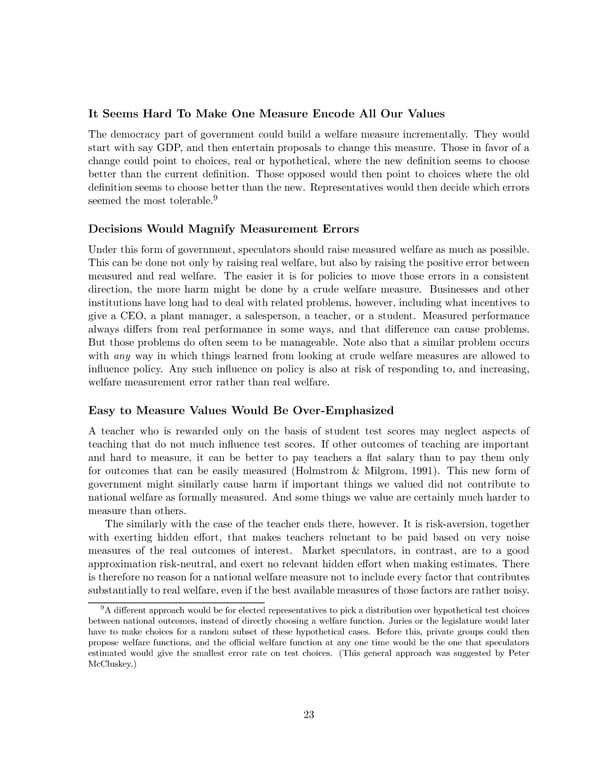It Seems Hard To Make One Measure Encode All Our Values The democracy part of government could build a welfare measure incrementally. They would start with say GDP, and then entertain proposals to change this measure. Those in favor of a change could point to choices, real or hypothetical, where the new definition seems to choose better than the current definition. Those opposed would then point to choices where the old definition seems to choose better than the new. Representatives would then decide which errors seemed the most tolerable.9 Decisions Would Magnify Measurement Errors Under this form of government, speculators should raise measured welfare as much as possible. This can be done not only by raising real welfare, but also by raising the positive error between measured and real welfare. The easier it is for policies to move those errors in a consistent direction, the more harm might be done by a crude welfare measure. Businesses and other institutions have long had to deal with related problems, however, including what incentives to give a CEO, a plant manager, a salesperson, a teacher, or a student. Measured performance always differs from real performance in some ways, and that difference can cause problems. But those problems do often seem to be manageable. Note also that a similar problem occurs with any way in which things learned from looking at crude welfare measures are allowed to influence policy. Any such influence on policy is also at risk of responding to, and increasing, welfare measurement error rather than real welfare. Easy to Measure Values Would Be Over-Emphasized A teacher who is rewarded only on the basis of student test scores may neglect aspects of teaching that do not much influence test scores. If other outcomes of teaching are important and hard to measure, it can be better to pay teachers a flat salary than to pay them only for outcomes that can be easily measured (Holmstrom & Milgrom, 1991). This new form of government might similarly cause harm if important things we valued did not contribute to national welfare as formally measured. And some things we value are certainly much harder to measure than others. The similarly with the case of the teacher ends there, however. It is risk-aversion, together with exerting hidden effort, that makes teachers reluctant to be paid based on very noise measures of the real outcomes of interest. Market speculators, in contrast, are to a good approximation risk-neutral, and exert no relevant hidden effort when making estimates. There is therefore no reason for a national welfare measure not to include every factor that contributes substantially to real welfare, even if the best available measures of those factors are rather noisy. 9Adifferent approach would be for elected representatives to pick a distribution over hypothetical test choices between national outcomes, instead of directly choosing a welfare function. Juries or the legislature would later have to make choices for a random subset of these hypothetical cases. Before this, private groups could then propose welfare functions, and the official welfare function at any one time would be the one that speculators estimated would give the smallest error rate on test choices. (This general approach was suggested by Peter McCluskey.) 23
 Shall We Vote on Values, But Bet on Beliefs? Page 24 Page 26
Shall We Vote on Values, But Bet on Beliefs? Page 24 Page 26